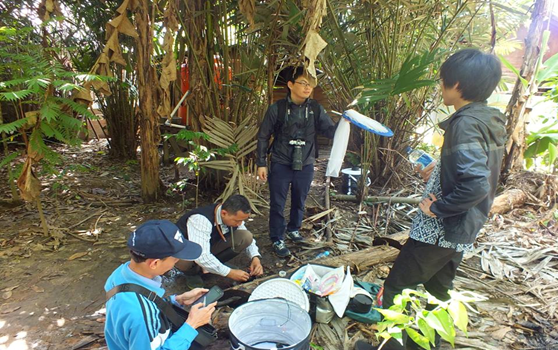
Entomology is the knowledge of insects, the most abundant form of animal life on earth. In tropical and subtropical regions, attention is drawn to the role of insects in transmitting diseases (vectors) that are caused by pathogens such as parasite (malaria, trypanosomiasis, filariasis,etc), viruses (dengue, encephalitis, chikungunya,etc), bacteria (salmonellosis, rickettsiosis, borrelia,etc) and causing by nuisanicm have serious social and economic consequences. Thus, the study on insects is a major scientific dicipline that impacts on the medical and veterinary aspects. Our objective is to carry out excellent research that is nationally and internationally at the forefront and (inter)nationally well-connected, while collaborative with Institute of Tropical Disease (ITD) Universitas Airlangga. The entomology studies collaboration has an outstanding focusing on bionomic, ecology, epidemiology, vector control, and molecular biology approaches.
Our mission is to unravel the ecological interaction between insects and other factors by combining ecologic andmolecular studies with investigations of the underlyi mechanisms. Vector and diseases management strategies being developed for eradication or controlling against in borne diseases.
Research activity scope :
Vector-borne diseases
- Vectors are organisms that transmit pathogens and parasites from one infected person (or animal) to another, causing serious diseases in human populations.
- These diseases are commonly found in tropical and sub-tropical regions and
 places where access to safe drinking-water and sanitation systems is problematic.
places where access to safe drinking-water and sanitation systems is problematic. - Vector-borne diseases account for 17% of the estimated global burden of all infectious diseases. The most deadly vector-borne disease, malaria, caused an estimated 627 000 deaths in 2012.
- However, the world’s fastest growing vector-borne disease is dengue, with a 30-fold increase in disease incidence over the last 50 years.
Molecular epidemiology against Mosquito borne disease
- Molecular epidemiology analysis of using the national surveillance to provide useful information concerning geographical distribution, transmission and genetic characterization against mosquito borne disease in the different regions.
- Genetic studies for mosquito borne disease isolates have made strong progress toward the understanding patterns of genotype abundance, replacements of new strain may lead to new epidemics and disease.
Vector Control
- Vector control remains as a key measure for prevention and control of these disease.
- Vector control against mosquito is any method to limit or eradicate the mosquito population which transmit disease pathogens. The most research frequent type of vector control is mosquito control using a variety of strategies.
- Base on biological control, our research focusing to use of natural vector predators, such as bacterial toxins or botanical compounds, can help control vector populations.
- Base on chemical control, our research focusing to use insecticide, larvicides, and repellents can be used to control vectors. For example, larvicides can be used in mosquito breeding zones; insecticides can be applied to killing adult mosquito, and use of personal repellents can reduce incidence of insect bites and thus infection.
Insecticide resistance
- Resistance to insecticides is one of the most well documented, and rapid, cases of evolutionary adaptation to environmental changes. Although only a limited number of resistance mechanisms have been implicated to date, the diversity within those enzyme families involved in metabolic resistance is likely to contribute substantially to resistance to many insecticide classes.
- Our research activity focusing for entomological and insecticide resistance monitoring in mosquito borne diseases endemic areas.
- Develop new, innovative vector control tools.
Vector monitoring/ mapping System
Entomology and Dengue study group have recently established a project in making real time monitoring application as a mean of control system to prevent dengue outbreak and as information source of dengue as well as dengue-related issues and vector distribution.